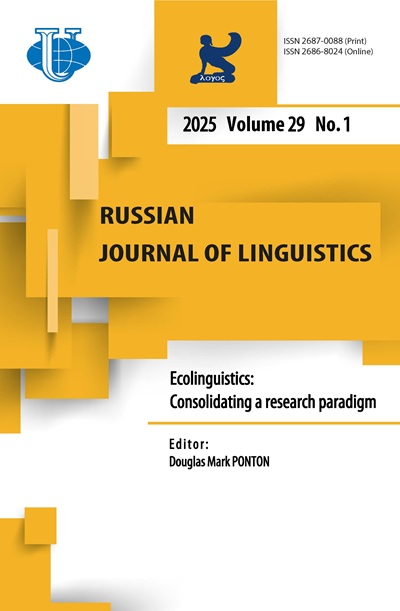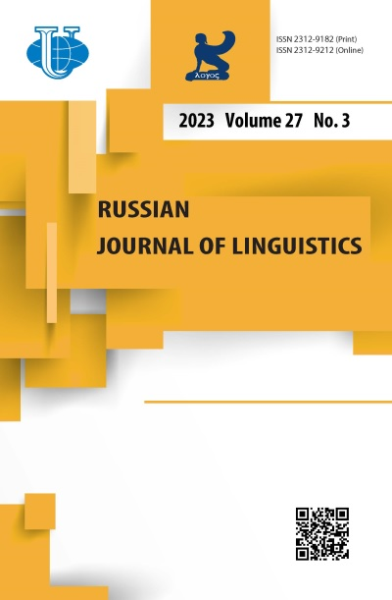Тонкое искусство говорить «нет» в персидском и английском языках: кросс-культурный и кросс-лингвистический аспекты
- Авторы: Кордестанчи Б.1, Сархош М.1, Моафиан Ф.2
-
Учреждения:
- Урмийский государственный университет
- Косарский университет Боджнорда
- Выпуск: Том 27, № 3 (2023)
- Страницы: 592-614
- Раздел: Статьи
- URL: https://journals.rudn.ru/linguistics/article/view/36171
- DOI: https://doi.org/10.22363/2687-0088-31702
- EDN: https://elibrary.ru/MZTMMH
Цитировать
Полный текст
Аннотация
Отказы создают сложности в коммуникации, поскольку они нередко являются источником межкультурного непонимания и могут восприниматься как угрожающие действия, требующие от говорящего извинений, смягчения речи или использования маркеров вежливости. Цель настоящего исследования - рассмотрение реализации речевого акта отказа между иранцами как представителями коллективистского общества и американцами, относящимися к индивидуалистическому обществу. Также исследовалось влияние социального статуса на выбор стратегии отказа. В качестве источников данных были выбраны два популярных сериала в жанре семейной драмы. Из двух сериалов в совокупности было отобрано 455 слов, фраз и высказываний, выражающих отказ. Собранные данные были закодированы с использованием таксономии стратегий отказа (Beebe et al. 1990). Для анализа данных использовались описательная статистика, биномиальные тесты и тесты Chisquare. Анализировалась частотность использования стратегий отказа с учетом социального статуса собеседников. Результаты не выявили статистически значимых различий между двумя культурами в отношении распространенности стратегий отказа, смещения и содержания смысловых формул, используемых при отказах. Однако наблюдались статистически значимые различия в частотности двух основных категорий отказов, а именно с использованием прямой и косвенной стратегий. Кроме того, учет социального статуса коммуникантов позволил выявить статистически значимые отличия в частотности стратегий отказа, используемых на трех социальных уровнях в обеих культурах. Результаты исследования способствуют межкультурному взаимопониманию и могут быть полезны для учителей и разработчиков дидактических материалов, направленных на развитие коммуникативной компетентности учащихся.
Ключевые слова
Об авторах
Бахаре Кордестанчи
Урмийский государственный университет
Автор, ответственный за переписку.
Email: b.kordestanchi@urmia.ac.ir
ORCID iD: 0000-0003-1736-3310
получила степень PhD по прикладной лингвистике в Государственном университете Урмия (Иран) и преподает там в настоящее время. Она занимается исследованиями в области прагматики и дискурс-анализа.
Урмия, ИранМехди Сархош
Урмийский государственный университет
Email: m.sarkhosh@urmia.ac.ir
ORCID iD: 0000-0002-2483-4662
получил степень PhD по прикладной лингвистике в Тегеранском университете. В настоящее время он является старшим преподавателем в Государственном университете Урмия (Иран), где преподает ряд дисциплин магистрантам и аспирантам. Его исследовательские интересы сосредоточены в области прагматики и дискурс-анализа.
Урмия, ИранФатеме Моафиан
Косарский университет Боджнорда
Email: f.moafian@kub.ac.ir
ORCID iD: 0000-0002-3782-1561
имеет степень PhD по прикладной лингвистике и является старшим преподавателем в Косарском университете Боджнурда (Иран). Она соавтор нескольких научных статей, опубликованных в Иране и за рубежом, в частности в журналах Frontiers in Psychology, International Review of Applied Linguistics in Language Teaching, System, ELT, Asian EFL Journal, а также двух книг. В сферу ее научных интересов входят прагматика, педагогическая психология и педагогика.
Боджнорд, ИранСписок литературы
- Allami, Hamid & Amin Naeimi. 2011. A cross-linguistic study of refusals: An analysis of pragmatic competence development in Iranian EFL learners. Journal of Pragmatics 43 (1). 385-406.
- Austin, John Langshaw. 1962. How to Do Things with Words. London: Oxford University Press.
- Beebe, Leslie M, Tomoko Takahashi & Robin Uliss-Weltz. 1990. Pragmatic transfer in ESLrefusals. In Robin C. Scarcella, Ebbe Sloth Andersen & Stephen D. Krashen (eds.), Developing communicative competence in second language, 55-73. New York: Newbury House.
- Bella, Spyridoula. 2014. Developing the ability to refuse: A cross-sectional study of Greek FL refusals. Journal of Pragmatics 61. 35-62.
- Brown, Penelope & Stephen C Levinson. 1987. Politeness. Some Universals in Language Usage. Cambridge University Press.
- Chang, Yuh-Fang. 2009. How to say no: An analysis of cross-cultural difference and pragmatic transfer. Language Sciences 31 (4). 477-493.
- Chang, Yuh-Fang & Ren Wei. 2020. Sociopragmatic competence in American and Chinese children’s realization of apology and refusal. Journal of Pragmatics 164. 27-39.
- Chen, Xing, Ye D Lei & Zhang Yanyin. 1995. Refusing in Chinese. In Gabriele Kasper (ed.), Pragmatics of Chinese as native and target language, 119-163. Manoa, HI: University of Hawai Press.
- Chen, Hongyin Julie. 1996. Cross-cultural comparison of English and Chinese metapragmatics in refusals. Unpublished Doctoral dissertation, Indiana University, Indiana, the United States.
- Cohen, Andrew. 1996. Speech acts. In Nancy Hornberger (ed.), Sociolinguistics and language teaching, 383-420. New York: Cambridge University Press.
- Deveci, Tanju & Jessica Midraj. 2021. “Can we take a picture with you?” The realization of the refusal speech act with tourists by Emirati Speakers. Russian Journal of Linguistics 25 (1).68-88. https://doi.org/10.22363/2687-0088-2021-25-1-68-88
- Drew, Paul. 1984 Speakers’ reportings in invitation sequences. In J. Maxwell Atkinson & John Heritage (eds.), Strucutres of social action, 129-151. Cambridge: Cambridge University Press.
- Eslami, Zohreh, Tatiana Larina & Roya Pashmforoosh. 2023. Identity, politeness and discursive practices in a changing world. Russian Journal of Linguistics 27 (1). 7-38. https://doi.org/10.22363/2687-0088-34051
- Ghazanfari, Mohammad, Alireza Bonyadi & Shirin Malekzadeh. 2013. Investigating cross-linguistic differences in refusal speech act among native Persian and English speakers. International Journal of Research Studies in Language Learning 2 (4). 49-63.
- Gladkova, Anna & Tatiana Larina. 2018. Anna Wierzbicka, language, culture and communication. Russian Journal of Linguistics 22 (4). 717-748. https://doi.org/10.22363/2312-9182-2018-22-4-717-748
- Hashemian, Mohammad. 2012. Cross-cultural differences and pragmatic transfer in English and Persian refusals. The Journal of Teaching Language Skills 4 (3). 23-46.
- Hassani, Roholla, Mehdi Mardani & Hossein Vahid Dastjerdi. 2011. A comparative study ofrefusals: Gender distinction and social status in focus. Language, Society and Culture 32.37-46.
- Hofstede, Geert. 1986. Cultural differences in teaching and learning. International Journal of Intercultural Relations 10 (3). 301-320.
- Hofstede, Geert. 2011. Dimensionalizing cultures: The Hofstede model in context. OnlineReadings in Psychology and Culture 2 (1).
- Hofstede, Geert & Michael Minkov. 2013. Values Survey Module 2013 Manual. Available online at: https://geerthofstede.com/wp-content/uploads/2016/07/Manual-VSM-2013.pdf (accessed 3 February 2020).
- Iwuchukwu, Onyeka & Abdul R Yesufu. 2013. Elements of the Drama. National University of Nigeria Lagos. Nigeria.
- Kasper, Gabriele. 2000. Data collection in pragmatics research. In Helen Spencer-Oatey (ed.), Culturally speaking: Managing rapport through talk across cultures, 316-341. New York: Continuum.
- Krauss, Robert M., Palmer Morrel-Samuels & Christina C. Colasante. 1991. Do conversational hand gestures communicate? Journal of Personality and Social Psychology 61 (5). 743-754.
- Larina, Tatiana. 2015. Culture-specific communicative styles as a framework for interpreting linguistic and cultural idiosyncrasies. International Review of Pragmatics 7 (5). Communicative Styles and Genres. [Special issue]. 195-215.
- Levinson, Stephen. 1983. Pragmatik. Tübingen: Niemeyer. https://doi.org/10.1017/cbo9780511813313
- Liao, Chao & Mary I Bresnahan. 1996. A contrastive pragmatic study on American English and Mandarin refusal strategies. Language Sciences 18 (3-4). 703-727.
- McClenaghan, Elliot. 2022. The binomial test. Retrieved from https://www.technologynetworks.com/informatics/articles/the-binomial-test-366022 (accessed 3 February 2023).
- Litvinova, Angela V. & Tatiana V. Larina. 2023. Mitigation tools and politeness strategies in invitation refusals: American and Russian communicative cultures. Training, Language and Culture 7 (1). 116-130. https://doi.org/10.22363/2521-442X-2023-7-1-116-130
- Mecheti, Marisa & Hudson Geogina. 2014. Sitcoms: A window of opportunity for teaching and learning. Humanising Language Teaching 14 (5). 245-256.
- Moafian, Fatemeh, Naji Yazdi & Abdullah Sarani. 2018. A gendered study of refusal of request speech act in the three languages of Persian, English, and Balouchi: A within language study. International Review of Applied Linguistics in Language Teaching 59 (1). 55-85.
- Moafian, Fatemeh, Naji Yazdi & Abdullah Sarani. 2019. The refusal of request speech act in Persian, English, and Balouchi languages: A cross-cultural and cross-linguistic study. International Review of Applied Linguistics in Language Teaching. https://doi.org/10.1515/iral-2018-0357
- Moaveni, Hiroko Tsuiki. 2014. A study of refusal strategies by American and internationalstudents at an American University. Unpublished master’s thesis. Minnesota State University, Mankato, Minnesota, Gayle L. Nelson, Joan Carson, Mahmoud Al Batal & Waguida El. Bakary. 2002. Cross-cultural pragmatics: Strategy use in Egyptian Arabic and American English refusals. Applied Linguistics 23 (2).163-189.
- Morkus, Nader. 2009. The realization of the speech act of refusal in Egyptian Arabic byAmerican learners of Arabic as a foreign language. Unpublished Ph.D. dissertation. University of South Florida, USA.
- Okazawa, Sachiyo. 2014. Pauses and fillers in second language learners’ speech. Studies in Language and Culture 23. 52-66.
- Pelto, Pertti J. 1968 The difference between tight and loose societies. Transaction 5 (5). 37-40.
- Potter, Jonathan. 2002. Two kinds of natural. Discourse Studies 4 (4). 543-548.
- Putri, I.a.p.s.a.d.p., D.p Ramendra & I.w Swandana. 2019. An analysis of speech act used in Harry Potter and The Goblet of Fire movie. International Journal of Language and Literature 3 (2). 78. https://doi.org/10.23887/ijll.v3i2.20845
- Reddy, Chitra. 2021. Verbal communication advantages and disadvantages. https://content.wisestep.com/top-advantages-disadvantages-verbal-communications/ (accessed October 2021).
- Sarkhosh, Mehdi & Ali Alizadeh. 2017. Compliment response patterns between younger and older generations of Persian speakers. Pragmatics and Society 8 (3). 421-446.
- Sawyer, Rebecca & Guo-Ming Chen. 2012. The impact of social media on intercultural adaptation. Intercultural Communication Studies 21 (2). 151-169.
- Tajeddin, Zia & Hojjat Rassaei Moqadam. 2023. Perception of impoliteness in refusal and response to it by native speakers of English and Persian. Russian Journal of Linguistics27 (1). 88-110. https://doi.org/10.22363/2687-0088-33391
- Tamimi Sa’d, Seyyed Hatam & Mohammad Mohammadi. 2014. Iranian EFL learners’ sociolinguistic competence: Refusal strategies in focus. Journal of Language and Linguistic Studies 10 (2). 48-66
- Wardhaugh, Ronald. 2006. An Introduction to Sociolinguistics. MA: Malden Publishing.
- Yang, Jia. 2008. How to say ‘no’ in Chinese: A pragmatic study of refusal strategies in five TV series. In Marjorie K.M. Chan & Hana Kang (eds.), Proceedings of the 20th North American conference on Chinese linguistics, 1041-1058. Ohio: The Ohio State University Press.
- Yuan, Yi. 2001. An inquiry into empirical pragmatics data-gathering methods: Written DCTS, oral DCTs, field notes, and natural conversations. Journal of Pragmatics 33. 271-292.
- Zaw, Hsu Thiri. 2018. The impact of social media on cultural adaptation process: Study on Chinese government scholarship students. Advances in Journalism and Communication 6. 75-89.

















